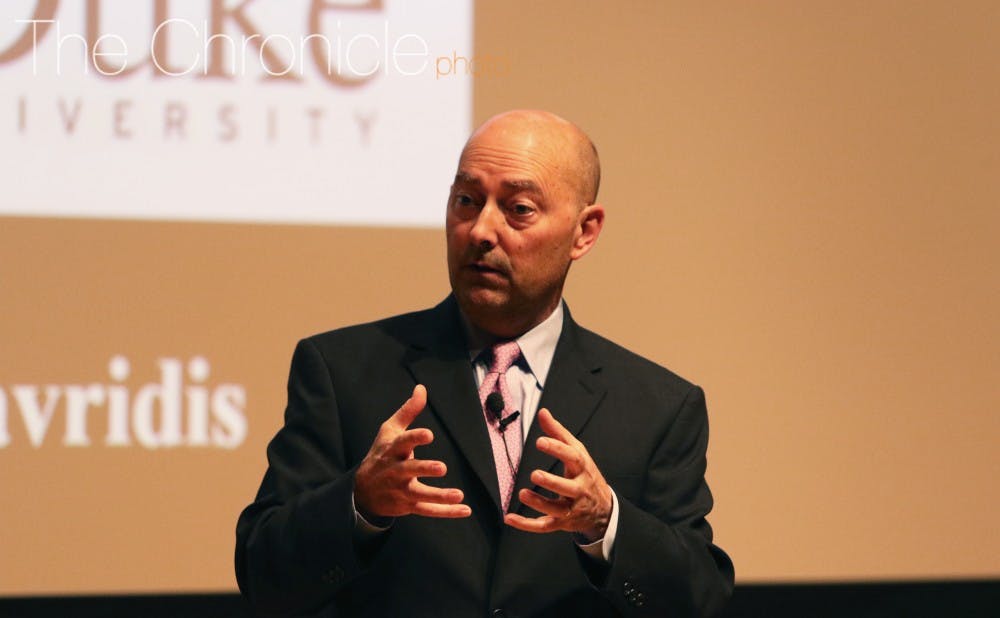Despite a deteriorating relationship with Russia, the U.S. has “absolutely not” returned to the Cold War, retired Admiral James Stavridis told students and faculty Tuesday.
Stavridis, the former supreme allied commander of the North Atlantic Treaty Organization, better known as NATO, discussed the challenges of achieving post-9/11 security. He emphasized the importance of alliances given the ruthless nature of groups such as ISIS.
“We tried to create security by building walls. Here I was, at the beginning of the 21st century, behind the strongest walls in the world," Stavridis said of his experience on 9/11. "I was in the Pentagon; I’m guarded by the strongest military on the planet. Was I safe? No. That’s the 21st century, and that is the set of challenges that NATO is dealing with.”
Stavridis said he is hopeful the Iran Nuclear Deal will ensure it is at least 10 years before Iran gets its hands on a nuclear weapon. However, he added that some countries like North Korea will not have to wait.
“North Korea already has nuclear weapons,” he said. “They have a young, untested, morbidly obese leader who is addicted to opioids and has a really bad haircut. He already has the ability to deliver these weapons at range. This is a terrible combination.”
What kept him up at night, however, had less to do with Kim Jong-un and more to do with Thomas Edison and cyberterrorism.
Ukraine recently saw their electrical grid for the western part of the country go down for about 12 hours, and Estonia and Lithuania have also fallen victim to cyberterrorism within the last five years, he noted.
“These attacks are almost certainly coming from Russia,” Stavridis said. “Over time, they are going to be very dangerous for the NATO alliance and in our own election cycle this year, pretty clearly from Russia.”
Stavridis stressed the vulnerability of America's electric grid and the lack of innovation in the area. If Edison were to show up in modern America, Stavridis said he would be able to work on the current grid with no problem. In contrast, he said Alexander Graham Bell, inventor of the telephone, would look at modern phones “like a pig looking at a wrist watch."
Modern connectivity, particularly through social media sites like Facebook, has allowed for the rapid expansion and recognition of groups such as ISIS. Stavridis denied the proposition of negotiating with them—“we’re going to find them, and we are going to kill them.”
The globalization of violence has increased the need for alliances to help unite the resources necessary to mount a united front.
“NATO is a political challenge married to an organization of extraordinary military capabilities," he said. "It is a tremendous force, which has been used, generally, for good."
The basis of the alliance is a value-based one, with the relationships forming between nations that emphasize the same ideas. With its 28 nations making up approximately half of the world’s gross domestic product, NATO is the “richest, most effective military alliance in history," he said.
“No one is as smart as all of us thinking together,” the retired admiral said. “That’s what alliances are. No one person, no one nation is as smart as all of us thinking together.”
John Leonard, a former commander in the Coast Guard, said that he found Stavridis' case “really powerfully stated."
Junior Aron Rimanyi, co-chair of Duke's Program in American Grand Strategy—which helped sponsor the event—said he connected most with how Stavridis found life balance even while dealing with such complex and intense world problems.
“Try to listen. Don’t take yourself too seriously,” Stavridis said. “What are people going to say about you at your funeral? Finding that balance is crucial in life, and I think it is a conscious decision that we make about how to approach the world.”
Get The Chronicle straight to your inbox
Signup for our weekly newsletter. Cancel at any time.
Bre is a senior political science major from South Carolina, and she is the current video editor, special projects editor and recruitment chair for The Chronicle. She is also an associate photography editor and an investigations editor. Previously, she was the editor-in-chief and local and national news department head.
Twitter: @brebradham
Email: breanna.bradham@duke.edu

